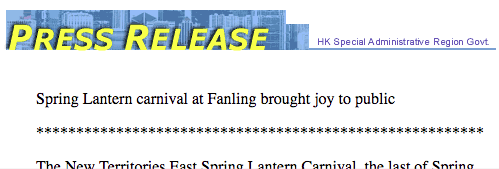|
This blog post is about a simple noun, ‘joy', and its related adjective form ‘joyful’ — two words commonly used in Hong Kong to describe public events and activities in a very positive way. Here are some examples: "With programmes specifically for learning Putonghua together with songs in Putonghua, this channel can help Hong Kong audience to learn Putonghua in an easy way and experience the joy of speaking Putonghua in everyday life." Native English speakers find all these Hong Kong examples rather strange. The reason is that, in standard English, ‘joy’ and ‘joyful’ have quite specific meanings connected with intense personal happiness. In other words, in standard English ‘joy’ and ‘joyful’ tend to be reserved for quite specific events or activities that cause a powerful positive emotional response.
0 Comments
Recently I was running a training course on effective writing for a large Hong Kong organisation. After we had talked about strategies for getting the message across to readers directly and effectively, one of the participants asked me to come and look at a poster pinned up on the noticeboard in the training room. “What do you think?” she asked. “Isn’t this just what you were talking about?” And yes, she was quite right. In our class, we had been talking about a very common Hong Kong habit when writing English. Following Chinese practice, writers often start their sentences with a subordinate clause (offering background information) before proceeding to deliver the main clause (containing the key information or message of the sentence). One common type of subordinate clause is the kind that is introduced by a subordinating conjunction, like after, although, because, before, unless or while.
This poster is just such an example. This sign at the entrance to a construction site caught my attention a little while ago. For a simple message of 13 words, it managed to pack in an awful lot of errors! How many can you identify? Compare your list with the seven that I point out below.
I’ve recently noticed a lot of cases where Hong Kong writers are unsure about — or just wrong about — a particular structure. It can be illustrated by these two sentences:
1) Money invested in the fund attracts interest of 6%. 2) People investing in the fund have access to our expert financial advisors. In both sentences, the underlined portion is the noun phrase subject of the sentence. What we are interested in is that part of the noun phrase subject that comes after the head noun (i.e. after money & people, respectively). In each case, we have a form of the same verb, ‘invest’, but in (1) we use the -ed form ‘invested’, and in (2) the -ing form ‘investing'. Why? My company Cygnet Communications Limited was first registered in Hong Kong back in 2003. On registering the new company, I had to choose a name for it -- but what to call it? Being a Westerner, I didn't favour the Chinese style of naming companies with auspicious words -- like Rich & Fame Ltd, or Gold Abundance Investment Ltd, or Wealth Ahead Ltd, or Prosperity Creation Ltd (all of these are real existing or former companies registered in Hong Kong). If I had had a more practical mind, perhaps I would have selected a company name that gave people some idea of what my business did -- for example, English Language Ltd (already taken). Why then did I name my company Cygnet Communications Limited? Obviously the word 'communications' captures the idea of English communication, which is related to the services we offer. But Cygnet? -- it's an English word and means a young swan. Swans, in case you haven't seen one, are magnificent river birds found widely across Europe. The picture below shows a swan, but it also shows three cygnets -- young swans that have not yet reached maturity. Signs like this one, reminding readers to 'beware of your belongings', are quite common in Hong Kong. Their purpose is to warn us of the risk of loss or theft, so that we pay more attention to the valuables that we are carrying with us. In Hong Kong, 'beware' is often the generic term used to provide this warning. However, in standard English the word 'beware' has a much more specific meaning and usage. Here is the Oxford online dictionary definition: These two images both include examples of a noun ('crime') that premodifies another noun (crime agency / crimes unit). In one of them, 'crime' is in the singular, but in the other it is pluralised. Today's post was triggered by seeing large warning notices that the Electrical & Mechanical Services Department (EMSD) has recently begun placing on the entrance to public escalators all around town. This is what they say: This sign uses the word 'cargoes' incorrectly. In this blog post I will talk a little bit about why 'cargoes' is incorrect here, and what alternatives there are. We've now left behind the Year of the Monkey and launched into a new Lunar Year -- so let me (rather belatedly) wish all my readers of the Cygnet blog a healthy and prosperous Year of the Rooster ahead! Of the 12 animals that are zodiac signs and make up the 12 Chinese lunar years, the Rooster is perhaps the most unusual and interesting one from an English language point of view. Why? Well, as far as I am aware, none of the Chinese terms for animals in the zodiac are sex-specific -- information I gleaned from this article. As for the usual English names for the 12 zodiac animals, none of them are sex-specific either --- except for rooster! Most Hong Kong English users know what 'meat, poultry and eggs' are -- and in case you're unsure, this FEHD notice helpfully illustrates raw examples of each category. But what about 'game'? -- what kind of thing is this? No, this is not an error or a typo. Today's blog post is for a change not about English errors in Hong Kong, but simply an introduction to an unusual word that you might like to add to your vocabulary if it's not already there. |
About this blogThis blog arises from keeping an eye on English in Hong Kong. I often use signs, notices and advertisements that I see as starting points to write about English issues that commonly challenge Hong Kong writers. Archives
October 2017
Categories
All
|














 RSS Feed
RSS Feed